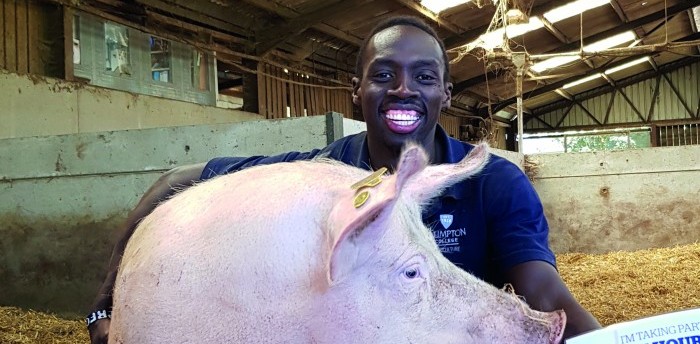Young NPA member Flavian Obiero, who is pig unit manager at Plumpton College and is studying part-time for an MSc in Livestock Health and Production, gives his thoughts on how to get more young people into the pig sector
“I don’t like pigs!” “I can’t stand their smell!” “I’ve never worked with pigs, so I don’t know anything about them.”
These are phrases I hear from students almost daily at work. It has always baffled me how students as young as 16 already have such a strong dislike of pigs. I think it stems from the amount of exposure one has growing up.
I work at Plumpton College, a land-based college in East Sussex, where agriculture students have equal access to cattle, pigs and sheep. Unsurprisingly, nine out of 10 students tend to choose to work with cattle and sheep as opposed to pigs – most of them would not even have had previous exposure to pigs.
What do the cattle and sheep industries offer that the pig industry can’t? What is it that puts young people off pigs before they’ve even worked with them?
I have always been around animals one way or another, from pets to livestock. I was 13 when I first worked (more hindering than helping) with pigs on my uncle’s farm in Nairobi, Kenya. I remember being fascinated by them and, oddly enough, liking their smell – this novelty has definitely worn off now!
I had three aspirations as a lad – I wanted to be a chef, a doctor and a vet. I didn’t have a clue that I would have needed to set aside at least a decade to accomplish all three.
Unfortunately, I have only succeeded in one of my three aspirations – being my own personal chef. Having a career in farming was never on the radar for me. I’d even say I ended up farming by accident, but as accidents go, this one hasn’t turned out too badly.
In my opinion, the pig industry is one of the most resilient in British farming. It provides plenty of job opportunities for anyone willing to work hard and push themselves to improve. But in the decade I have spent in the industry, it is evident that there are not enough of the young generation coming into pig farming.
We as an industry seem to rely on the few people from pig farming families to carry on family businesses. More new entrants are needed, from all walks of life, to bring in new ideas and push the industry forward.
Growing up, most kids would have seen cattle and sheep in fields grazing. Cattle and sheep are also reared all over the country whereas pigs are concentrated in certain areas, such as East Anglia and Yorkshire.
Up to 60% of British pigs are kept indoors – therefore the chances of seeing pigs if you aren’t from pig farming counties are slim. Access to pig farms is also limited to the general public due to the perception portrayed mainly by the media.
Agriculture should be reintroduced into the curriculum from an early age in order to ensure kids learn where their food comes from. For some people in society, the connection of food and where it comes from is almost non-existent.
Schemes such as ‘FaceTime a Farmer’ by LEAF and ‘#FARM24’ by Farmers Guardian and Morrisons are incredible examples of educating the public about British farming and how food is produced. I took part in #FARM24 and I was amazed at how little people knew about pigs, both farming and non-farming folk.
We are stuck between a rock and a hard place as pig farmers. On one hand we want to involve the younger generation from non-farming backgrounds into pig farming. On the other, we are fighting against a stigma from society about pig farming… the smell and how mucky the job is.
Every job has its good and bad bits. Being from a non-farming background, I have learnt a heck of a lot since starting farming. Pig farming is a difficult, but enjoyable and rewarding job.
There are apprenticeship schemes available – what’s lacking is the availability of apprentices. Perhaps more advertising from different bodies within the pig industry to educational establishments across the country, from inner cities to rural areas, would encourage more young people to farm pigs.
The lack of exposure to pigs shouldn’t be a hindrance to anyone thinking about a job in the industry. Pig farmers are always willing to teach and employ anyone that is ambitious and hard-working.




